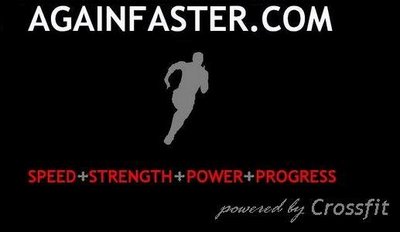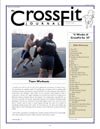Versus the Specialist

Yesterday, I wrote about my new-found competitive streak. I'm pitting my athleticism and fitness against the single sport athletes of the world, in an attempt to see how the generalist (me) stacks up against the specialists (them).
Last night, the laboratory of life presented me with the perfect yardstick to carry out this comparison.
I ran the JP Morgan Corporate challenge. 13,000 people showed for this lovely event. The majority were not athletes, but I managed to find a competitor.
Tim Rowell is a co-worker and a marathon runner, and he happened to enter the race. We started the race together, about two hundred feet behind the blue and yellow starting line. We didn't end the race together.
I finished in 24:48. Tim managed 23:15. He's pretty damn fast.
It breaks down like this:
3.5 miles @ 24:48 = 7:05:40 per mile
3.5 miles @ 23:15 = 6:38:40 per mile
I'll let you draw your own conclusions. Tim isn't an elite runner, but he certainly isn't a weekend warrior either. His training consists of long distance runs, interval work, and light weight training. Mine consists of interval work, heavy weight training, and a ton of metabolic conditioning. Crossfit.
An accurate power output calculation for this one would be really complicated, I'd probably mess it up, and you wouldn't understand it anyway. Nonetheless, I'd venture to say that my power output was higher than Tim's, simply because of the differential in our weights.
Here's a back-of-the-envelope attempt at calculating power output. It will be way off base, because running involves pendulums, coefficients of friction, and varying periods of ground contact and air time. I know this calculation is wrong, so don't send me any geeky flame-mail, or I'll find you and crush your little head.
Tim weighs about 148 pounds (67.27 kg), while I fluctuate between 168 and 172 (76.36 kg). His total time was 1395 seconds. Mine was 1488 seconds. We went 3.5 miles (5630 meters).
If we keep the coefficient of friction constant at 0.3, and say that neither Tim or I left the ground (ever), we get a work calculation that looks like this:
Tim =(67.27 kg * 9.8 m/s/s * 0.3 coeff) * 5630 meters * Cos 0
= 197.78 N * 5630 meters * 1
= 1113511 J
Jon = (76.36 kg * 9.8 m/s/s * 0.3 coeff) * 5630 meters * Cos 0
= 224.5 N * 5630 meters * 1
= 1263926 J
The power outputs look like this:
Tim = 1113511 J/ 1395 seconds = 798.22 watts
Jon = 1263926 J/ 1488 seconds = 849.41 watts
Will Tagye should be happy to note that the lighter guy doesn't always have a higher power output, even when he wins the race. The rest of us should be happy that a Crossfitter holds up against a good marathoner at short distances.
The specialist won, but as Coach says, "We're good at what you do."
Go faster!

Yesterday, I wrote about my new-found competitive streak. I'm pitting my athleticism and fitness against the single sport athletes of the world, in an attempt to see how the generalist (me) stacks up against the specialists (them).
Last night, the laboratory of life presented me with the perfect yardstick to carry out this comparison.
I ran the JP Morgan Corporate challenge. 13,000 people showed for this lovely event. The majority were not athletes, but I managed to find a competitor.
Tim Rowell is a co-worker and a marathon runner, and he happened to enter the race. We started the race together, about two hundred feet behind the blue and yellow starting line. We didn't end the race together.
I finished in 24:48. Tim managed 23:15. He's pretty damn fast.
It breaks down like this:
3.5 miles @ 24:48 = 7:05:40 per mile
3.5 miles @ 23:15 = 6:38:40 per mile
I'll let you draw your own conclusions. Tim isn't an elite runner, but he certainly isn't a weekend warrior either. His training consists of long distance runs, interval work, and light weight training. Mine consists of interval work, heavy weight training, and a ton of metabolic conditioning. Crossfit.
An accurate power output calculation for this one would be really complicated, I'd probably mess it up, and you wouldn't understand it anyway. Nonetheless, I'd venture to say that my power output was higher than Tim's, simply because of the differential in our weights.
Here's a back-of-the-envelope attempt at calculating power output. It will be way off base, because running involves pendulums, coefficients of friction, and varying periods of ground contact and air time. I know this calculation is wrong, so don't send me any geeky flame-mail, or I'll find you and crush your little head.
Tim weighs about 148 pounds (67.27 kg), while I fluctuate between 168 and 172 (76.36 kg). His total time was 1395 seconds. Mine was 1488 seconds. We went 3.5 miles (5630 meters).
If we keep the coefficient of friction constant at 0.3, and say that neither Tim or I left the ground (ever), we get a work calculation that looks like this:
Tim =(67.27 kg * 9.8 m/s/s * 0.3 coeff) * 5630 meters * Cos 0
= 197.78 N * 5630 meters * 1
= 1113511 J
Jon = (76.36 kg * 9.8 m/s/s * 0.3 coeff) * 5630 meters * Cos 0
= 224.5 N * 5630 meters * 1
= 1263926 J
The power outputs look like this:
Tim = 1113511 J/ 1395 seconds = 798.22 watts
Jon = 1263926 J/ 1488 seconds = 849.41 watts
Will Tagye should be happy to note that the lighter guy doesn't always have a higher power output, even when he wins the race. The rest of us should be happy that a Crossfitter holds up against a good marathoner at short distances.
The specialist won, but as Coach says, "We're good at what you do."
Go faster!




















1 Comments:
Good work. As you get better at Crossfit, you'll get better at running too. Make sure your form is good too, as that's very important. Make sure your foot lands right underneath you on each step, causing you to land on your midfoot. Do not land on the heels!
Post a Comment
<< Home